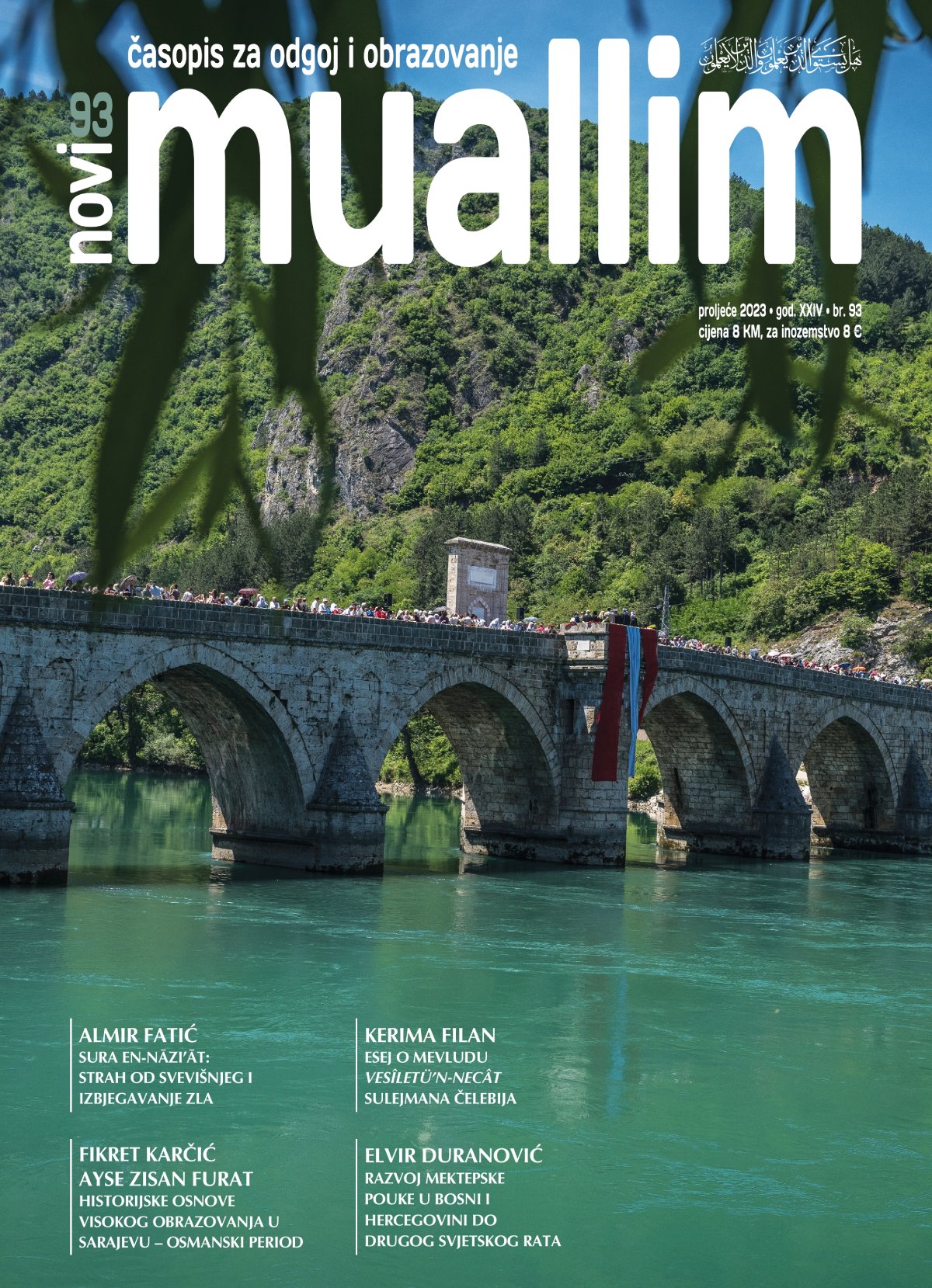Esej o mevludu Vesîletü'n-Necât Sulejmana Čelebija
DOI:
https://doi.org/10.26340/muallim.v24i93.2014Ključne riječi:
poslanik Muhammed, a.s., Sulejman Čelebi, sadržaj Mevluda, elementi tesavvufa, ljubav prema Stvoritelju i stvorenomSažetak
UDK: 821.512.161.09
UDK: 28-29
Mevlud koji je spjevao Sulejman Čelebi na turskom jeziku u prvoj deceniji 15. stoljeća drži se jednim od najznačajnijih djela ukupne mevludske književnosti. Predstavljao je uzor osmanskim pjesnicima koji su u narednim stoljećima sastavljali poetska djela u slavu Poslanika islama Muhammeda, a.s., na turskom ili kojem drugom jeziku. Ta se djela valoriziraju upoređivanjem s Mevludom Sulejmana Čelebija, kako s obzirom na književnoumjetničke vrijednosti, tako i s obzirom na sadržaj spjeva. U ovome radu komponiranom kao esej predstavlja se sadržaj Mevluda Sulejmana Čelebija. Šesnaest pjevanja u Mevludu autorica vidi u tri tematske grupe: (1) pjevanja koja govore o Jedinstvu Boga, dž.š., o stvaranju svijeta i Poslanikove, a.s., prirode, (2) pjevanja koja se odnose na Poslanikov život na ovome svijetu, (3) ona u kojima se izražavaju pohvale biću Poslanika, a.s. Sva su pjevanja prožeta Poslanikovim uputama ljudima koje ih vode do spasa – koje su vesîletü'n-necât. U radu se ističe da Sulejman Čelebi opisuje obje prirode Muhammeda, a.s.: unutarnju (poslaničku prirodu) i izvanjsku prirodu (ljudsku formu). Ukazuje se na elemente tesavvufskog učenja zastupljene u Mevludu koji pjesnika Sulejmana Čelebija predstavljaju kao mutesavvifa. Spjevan snagom ljubavi prema Bogu, dž.š. i Njegovom najodabranijem robu, poslaniku Muhammedu, a.s., ovaj Mevlud dopire do osjećanjā i razuma vjernikā i svakome nešto govori. U tome je razlog njegove široke omiljenosti.
Downloads
Objavljeno
How to Cite
Broj časopisa
Rubrika
License

This work is licensed under a Creative Commons Attribution 4.0 International License.
Naknada:
a. Časopis ne naplaćuje naknadu za obradu članaka (APC) i naknadu za podnošenje članaka.
Autori koji objavljuju u ovom časopisu pristaju na sljedeće uvijete:
- Autori zadržavaju autorska prava i pružaju časopisu pravo prvog objavljivanja, pri čemu će rad jednu godinu po objavljivanju biti podložan licenci Creative Commons imenovanje koja omogućuje drugima da dijele rad uz uvijet navođenja autorstva i izvornog objavljivanja u ovom časopisu.
- Autori mogu izraditi zasebne, ugovorne aranžmane za ne-ekskluzivnu distribuciju rada objavljenog u časopisu (npr. postavljanje u institucionalni repozitorij ili objavljivanje u knjizi), uz navođenje da je rad izvorno objavljen u ovom časopisu.


